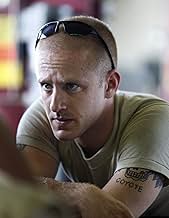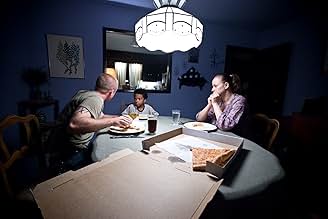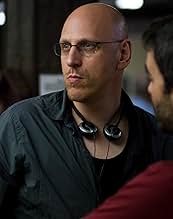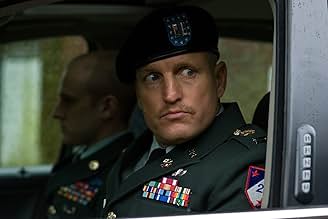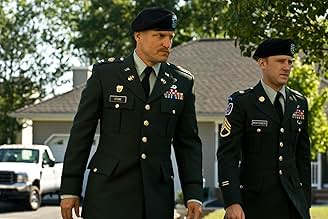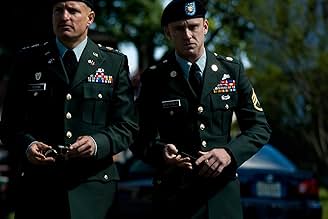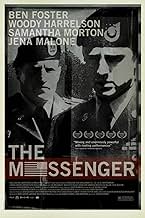VALUTAZIONE IMDb
7,1/10
37.733
LA TUA VALUTAZIONE
Un soldato americano lotta con un dilemma etico quando viene coinvolto con la vedova di un ufficiale caduto.Un soldato americano lotta con un dilemma etico quando viene coinvolto con la vedova di un ufficiale caduto.Un soldato americano lotta con un dilemma etico quando viene coinvolto con la vedova di un ufficiale caduto.
- Regia
- Sceneggiatura
- Star
- Candidato a 2 Oscar
- 17 vittorie e 47 candidature totali
Brian Adam DeJesus
- Teenager #1
- (as Brian DeJesus)
Recensioni in evidenza
I'm normally pretty hesitant about watching movies that have to do with war, but I'm glad that I chose to watch The Messenger. The movie took a completely different stance than what I'm used to when watching a movie about war. I never really thought about the people that had to deliver the message about a loved one that died in the military, and the way the story is told made me really care for the characters and feel for Harrelson's and Foster's characters and the important job that they have to perform. I would never want to have to do their job, but I truly respect the people that have to perform that job on a daily basis.
Harrelson, Foster and Samantha Morton put on really powerful performances that I honestly believed. And the rest of the cast did a fine job, as well. The emotion was so intense that I could feel it, and I easily got sucked into the story. It was a powerful movie that really made me think about the hardships in a sincere and thoughtful way. Overall, I enjoyed the film and I will continue recommending it to all my friends because I think everybody should watch it at least once. The story sticks with you long after you finish watching the movie.
Harrelson, Foster and Samantha Morton put on really powerful performances that I honestly believed. And the rest of the cast did a fine job, as well. The emotion was so intense that I could feel it, and I easily got sucked into the story. It was a powerful movie that really made me think about the hardships in a sincere and thoughtful way. Overall, I enjoyed the film and I will continue recommending it to all my friends because I think everybody should watch it at least once. The story sticks with you long after you finish watching the movie.
THE MESSENGER is by far and away one of the best works of art that addresses the deep tragedy behind the current U.S. war in the Middle East that I've seen. THE MESSENGER is an attempt by Director Oren Moverman and screen writer Alessandro Camon to place themselves between the ears of two career soldiers who serve a vital place in U.S. Army Special Services, Casualty Notification teams who inform the families of soldiers that their family member has been killed in battle. As someone who remembers full well the devastating feeling you got in your insides when you saw these teams turn up at the quarters of friends and their families when my own father was serving in Vietnam in the late 1960s, I found the film an important effort.
Staff Sergeant Will Montgomery (Ben Foster) is a Iraqi war veteran recovering from a battlefield wound who is reassigned to a State Department and United States Army Casualty Notification team, which is led by Captain Tony Stone (Woody Harrelson). Montgomery is also facing an impending breakup with his girlfriend Kelly (Jena Malone), who is playing him off against a wealthy, established suitor. When he is assigned to Stone's team, he is at first resentful. The military decorum which is demanded of the Casualty Notification Team is very exacting, with learned routines that come from a spit and polish military professionalism that requires a distance that is extremely difficult to attain.
What follows is a series of well connected vignettes, in which the younger soldier is asked to stride this nether world between the jaundiced, dry-drunk outlook of the seasoned bearer of bad news, Captain Stone. Stone is a bitter man with some frustrated ambitions of his own, which are revealed late in the film. Obsessed with sexual victories and teeter tottering between professional sobriety and complete emotional collapse, Stone is far from a steady colleague mentor. Encounters between he and Montgomery go into emotional roller coaster as each man learns to accept the other on his own terms while acting out an extremely trying professional military role.
In short time, Montgomery comes into contact with the widow of a soldier who sparks his interest, and becomes torn between professionalism and attraction to the young widow Olivia Pitterson (Samantha Morton). Montgomery is forced to grow into himself, despite his outward cynicism, and in short time begins to mentor his mentor, Captain Stone. The story has an open ending, with Montgomery seeking to be part of the life of widow Olivia as she is seeking to reestablish herself in New Orleans. No morals are offered, and this is the true strength of the work as a whole. There isn't much humor to be found here, but watch for the scene where a bender fried Montgomery and Stone attend the wedding reception of the woman who has broken Montgomery's heart. The lampoon of upper middle class phoniness is priceless.
The beauty of THE MESSENGER is that it does not fall into the usual pro war or antiwar camps that film making in an era like our own are usually so encumbered with. The film makers are ambitious and restrained. I have no idea whether the plot line is itself "contrived" as some here have argued, which I have to say is a rather ridiculous critique given that movies are rarely anything but "contrived", and this is particularly true of the genre we call the war film. Some who have written here seem to believe that the film discredits the "professionalism" of those who do the work of Stone and Montgomery, as though "professionalism" were itself some sort of fetish that protects one from emotional or mental illness generated by both war time trauma and the mystique of military culture. Such are the times in which we live, ideological blather is rampant.
THE MESSENGER is important because, in the words of that great Vietnam war era politician, the late President Lyndon Baines Johnson, it is art, it shows us who we are, not who we say we are, not who we think we are, but who we are as a people, and as a political culture. At various moments, it is clunky. But it is an early effort to give some true definition about what the debacle in Iraq has done to our culture, and to the people who are expected to do the dirty work of the empire's war machine. It is a rare gem in mainstream contemporary U.S. film making.
Staff Sergeant Will Montgomery (Ben Foster) is a Iraqi war veteran recovering from a battlefield wound who is reassigned to a State Department and United States Army Casualty Notification team, which is led by Captain Tony Stone (Woody Harrelson). Montgomery is also facing an impending breakup with his girlfriend Kelly (Jena Malone), who is playing him off against a wealthy, established suitor. When he is assigned to Stone's team, he is at first resentful. The military decorum which is demanded of the Casualty Notification Team is very exacting, with learned routines that come from a spit and polish military professionalism that requires a distance that is extremely difficult to attain.
What follows is a series of well connected vignettes, in which the younger soldier is asked to stride this nether world between the jaundiced, dry-drunk outlook of the seasoned bearer of bad news, Captain Stone. Stone is a bitter man with some frustrated ambitions of his own, which are revealed late in the film. Obsessed with sexual victories and teeter tottering between professional sobriety and complete emotional collapse, Stone is far from a steady colleague mentor. Encounters between he and Montgomery go into emotional roller coaster as each man learns to accept the other on his own terms while acting out an extremely trying professional military role.
In short time, Montgomery comes into contact with the widow of a soldier who sparks his interest, and becomes torn between professionalism and attraction to the young widow Olivia Pitterson (Samantha Morton). Montgomery is forced to grow into himself, despite his outward cynicism, and in short time begins to mentor his mentor, Captain Stone. The story has an open ending, with Montgomery seeking to be part of the life of widow Olivia as she is seeking to reestablish herself in New Orleans. No morals are offered, and this is the true strength of the work as a whole. There isn't much humor to be found here, but watch for the scene where a bender fried Montgomery and Stone attend the wedding reception of the woman who has broken Montgomery's heart. The lampoon of upper middle class phoniness is priceless.
The beauty of THE MESSENGER is that it does not fall into the usual pro war or antiwar camps that film making in an era like our own are usually so encumbered with. The film makers are ambitious and restrained. I have no idea whether the plot line is itself "contrived" as some here have argued, which I have to say is a rather ridiculous critique given that movies are rarely anything but "contrived", and this is particularly true of the genre we call the war film. Some who have written here seem to believe that the film discredits the "professionalism" of those who do the work of Stone and Montgomery, as though "professionalism" were itself some sort of fetish that protects one from emotional or mental illness generated by both war time trauma and the mystique of military culture. Such are the times in which we live, ideological blather is rampant.
THE MESSENGER is important because, in the words of that great Vietnam war era politician, the late President Lyndon Baines Johnson, it is art, it shows us who we are, not who we say we are, not who we think we are, but who we are as a people, and as a political culture. At various moments, it is clunky. But it is an early effort to give some true definition about what the debacle in Iraq has done to our culture, and to the people who are expected to do the dirty work of the empire's war machine. It is a rare gem in mainstream contemporary U.S. film making.
The Messenger is being overshadowed by other war films like The Hurt Locker, yet it is different and a great film. It has a very slow pace, but it has some incredibly powerful scenes and some amazing acting. Woody Harrelson is getting Oscar buzz for his performance, and he does deserve it. He has had a great year, with this and Zombieland. As great as he was, though, Ben Foster is just as great. Samantha Morton is probably better than both because she possesses a subtle and powerful gesture that only she has. I have only seen her in one other film, Synecdoche, New York, and she plays completely different types of personalities in both. Here, she is very quiet, but she is able to portray the reason why Foster's character is intrigued by her. The job that Stone and Montgomery (Foster and Harrelson) have is very difficult to do, and this is the first film to portray a job like that that I have seen. The director and writer did a great job. One of the flaws is that by the ending the film has no real directional focus, and this is a flaw in the screenplay. However, still a great film that should be seen not just for Harrelson but for the entire cast. Don't let the subject matter turn you away
The Messenger has incredible acting by Ben Foster, Woody Harrelson, and Samantha Morton.
The film has a curious flow to it. It begins predictable, yet remains engaging, exposing a heart-breaking consequence of war no family wants to face. Although the news remains the same, emotions run just as deep at each door. Every scene is handled marvelously through subtle performances by the actors. As the film unfolds, the viewer sinks into the complex characters on screen, discomforted by the internal struggles that slowly surface.
The Messenger is a non-linear, character-driven film with exceptional performances but might not be for everyone.
The film has a curious flow to it. It begins predictable, yet remains engaging, exposing a heart-breaking consequence of war no family wants to face. Although the news remains the same, emotions run just as deep at each door. Every scene is handled marvelously through subtle performances by the actors. As the film unfolds, the viewer sinks into the complex characters on screen, discomforted by the internal struggles that slowly surface.
The Messenger is a non-linear, character-driven film with exceptional performances but might not be for everyone.
I was fortunate enough to see this at the recent NY Drama Critics showcase, where both the director (Mr. Moverman) and a co-star (Woody Harrelson) participated in after-show Q&A. First of all, the film is superb - but the summaries I've seen so far do not do justice to what the movie is really about. Sure there are ethical dilemmas, sure there are soldiers who have returned from Iraq. But the great strength of this film is its focus on individual human beings and their reaction to humans' most important concerns: life, death and love. Oren Moverman - accomplishing this so beautifully, accurately and subtly in a small-budget film - is to be congratulated. Woody Harrelson, Ben Foster and Samantha Morton are all magically on the same wavelength in their performances. And the writing (by Camon and Moverman) acknowledges the fact that reasonably intelligent people might be watching... people who don't need every little detail spelled out. Oh yes - I should mention that there's a lot of humor interspersed throughout. The result of all this? The people you meet in this film will stay with you for a very long time - and you'll be glad for that.
Lo sapevi?
- QuizThe scene where Will (Ben Foster) and Olivia (Samantha Morton) speak to each other in her kitchen is eight minutes long and was shot in one take. Co-writer and director Oren Moverman allowed actors and actresses to improvise in certain scenes.
- BlooperSeveral times throughout the movie, Captain Stone notifies next of kin of deceased soldiers without first getting positive confirmation that they are, in fact, the soldier's next of kin. Casualty Notification Officers are required to make sure that the person they are addressing is actually the next of kin before making notification. This is not a mistake that a professional like Captain Stone would make.
- Citazioni
Captain Tony Stone: [walking to deliver the news to a wife that her husband has died] It could be worse. It could be Christmas.
- Versioni alternativeThere are two versions available. Runtimes are "1h 53m (113 min)" and "1h 45m (105 min) (Berlin International) (Germany)".
- ConnessioniFeatured in The Rotten Tomatoes Show: Zombieland/A Serious Man/Whip It (2009)
- Colonne sonorePut Your Hands Up
Performed by Plive (as P-Live)
Written by Christian Salyer, Isaiah Perkins
Published by Engine Co. 30/4tian Music/Engine Co. 35/4tian2 Music
Courtesy of 5 Alarm Music
I più visti
Accedi per valutare e creare un elenco di titoli salvati per ottenere consigli personalizzati
Dettagli
Botteghino
- Budget
- 6.500.000 USD (previsto)
- Lordo Stati Uniti e Canada
- 1.109.660 USD
- Fine settimana di apertura Stati Uniti e Canada
- 44.523 USD
- 15 nov 2009
- Lordo in tutto il mondo
- 1.595.417 USD
- Tempo di esecuzione1 ora 53 minuti
- Colore
- Mix di suoni
- Proporzioni
- 2.35 : 1
Contribuisci a questa pagina
Suggerisci una modifica o aggiungi i contenuti mancanti

Divario superiore
What is the French language plot outline for Oltre le regole - The Messenger (2009)?
Rispondi



